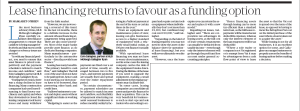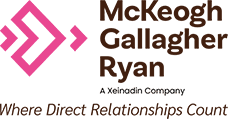HLB McKeogh Gallagher Ryan Audit Partner Eoin Gallagher was interviewed by the Sunday Business Post for their recent feature appraising the various lease financing options.
LEASE FINANCING RETURNS TO FAVOUR AS A FUNDING OPTION
By Margaret O’Brien
Like most business advisory firms, HLB McKeogh Gallagher Ryan carefully examine client finance arrangements to ensure that cashflow is being managed effectively and that excess credit charges or solvency issues are avoided.
“As with any financial product, you need to ensure that asset finance is priced competitively and the payment schedule is tailored to match income and cashflow,” said Eoin Gallagher, partner at HLB McKeogh Gallagher Ryan
 “During the recession, there was a sharp decline in lease financing. Many construction companies had used lease financing to fund heavy machinery and capital, and when they downsized or closed, the leasing companies took heavy losses and many withdrew from the Irish market.
“During the recession, there was a sharp decline in lease financing. Many construction companies had used lease financing to fund heavy machinery and capital, and when they downsized or closed, the leasing companies took heavy losses and many withdrew from the Irish market.
“However, we are now seeing a reversal of this trend. In the last 24 months, there is a definite increase in the amount of lease financing arrangements being approved. There are also more providers. Most of the major banks provide asset finance, as do dedicated leasing companies. Many manufacturers – particularly in the automotive sector – directly provide lease finance.”
Leasing has many benefits. “The primary benefit is cash flow,” said Gallagher. The full cost of the asset does not have to be paid up front, hence cash is not used up, nor does money have to be borrowed, thus preserving other bank and credit lines.
“It allows businesses to control and deploy assets without a significant drain on working capital.
“Budgeting is easier as the payments are fixed over a set period of time, usually averaged between two to five years, and interest payments are usually fixed and spread over the entire repayment period.
“In certain circumstances, payment schedules can be tailored to match income and cashflow; such flexibility of repayment structuring can assist seasonal businesses to reduce monthly outlay by factoring in a ‘balloon’ payment at the end of the term or certain times in the year.”
From an equipment and maintenance point of view, leasing can give businesses access to a higher standard of equipment with a relatively small initial outlay, as 100 per cent finance is usually available.
“With operational lease financing you may not have to worry about maintenance, and in some cases the leasing company carries the risks if the equipment breaks down. During the lifetime of the lease if you need to upgrade the equipment, making a small adjustment to the regular payments may facilitate this.
“In some cases, leasing companies can consolidate all assets and provide finance for their acquisition. This can be very beneficial for businesses such as start-ups and sole traders who are looking to expand and require certain tools or equipment where individually they don’t cost more than €2,000, but combined may cost over €10,000,” said Gallagher.
“Depending on the kind of leasing required, you may not need to show the asset on the balance sheet (i.e. operational lease financing), but you will never ultimately own the asset.
“However, once the lease expires you can return the asset and replace it with a new model.”
Regarding tax issues, Gallagher said: “There are corporation tax advantages in leasing assets, as the full cost of lease rentals/repayments can usually be deducted from taxable income – even though only the interest element will go through the profit and loss account under general accounting principles.
“Hence financing assets through leasing can be more tax efficient than a standard term loan, as the full lease repayments will be treated as tax deductible expenses, whereas only the interest element of the loan repayment will be tax deductible.
“Where a sole trader or company is not VAT registered or is exempt from VAT it may be advantageous from a cash flow point of view to lease the asset so that the VAT cost is spread over the term of the lease, as opposed to having to incur the full upfront VAT cost on the initial purchase of the asset where a loan is taken out to acquire the asset.”
While leasing is not for all businesses, it is an excellent option for some, and Gallagher encourages businesses to properly assess the benefits of leasing options before making a decision.
This article appeared in the print edition of the Sunday Business Post on 26 April 2015.
